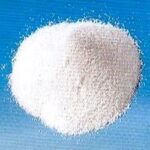Ground Granulated Blast Furnace Slag(GGBS)
Ground Granulated Blast Furnace Slag (GGBS) is a byproduct of the steel-making industry, and it has been widely used as a supplementary cementitious material in construction. GGBS is a fine powder, which is produced by quenching molten iron slag (a byproduct of iron and steel-making) with water. The water quenching process causes the molten slag to rapidly cool, forming granules that are then ground into a fine powder.
GGBS has several applications in construction and is commonly used in concrete as a replacement for cement. Here are some of the uses and benefits of GGBS in construction:
- Improves the strength and durability of concrete: GGBS can improve the strength and durability of concrete, making it more resistant to chemical attack, abrasion, and corrosion. This is because GGBS has a low permeability, which reduces the ingress of harmful substances and increases the density of the concrete.
- Reduces the carbon footprint of construction: Using GGBS in concrete can significantly reduce the carbon footprint of construction. GGBS is produced from a byproduct of the steel industry, which would otherwise be discarded as waste. By using GGBS, we can reduce the amount of cement needed, which reduces the CO2 emissions associated with cement production.
- Reduces the heat of hydration: The heat of hydration is the heat produced when cement reacts with water to form concrete. This heat can cause thermal cracking in concrete, which can reduce its durability. By using GGBS in concrete, we can reduce the heat of hydration, which reduces the risk of thermal cracking.
- Enhances workability: GGBS can enhance the workability of concrete, making it easier to place and finish. This is because GGBS reduces the water demand of concrete, which improves its flowability and reduces the risk of segregation and bleeding.
- Lowers the cost of construction: Using GGBS in concrete can lower the cost of construction. GGBS is generally cheaper than cement, and by replacing some of the cement with GGBS, we can reduce the overall cost of the concrete.
- USES of GGBS OTHER THAN construction
While GGBS is commonly used in construction, it also has other uses outside of the construction industry. Here are some of the applications of GGBS:
- Soil stabilization: GGBS can be used as a soil stabilizer to improve the strength and durability of soil. GGBS can be mixed with soil to increase its bearing capacity, reduce its compressibility, and improve its resistance to erosion.
- Agriculture: GGBS can be used as a fertilizer in agriculture. GGBS contains calcium, magnesium, and silicon, which are essential plant nutrients. GGBS can also improve soil structure, increase soil pH, and reduce soil salinity.
- Road construction: GGBS can be used in road construction as a stabilizing agent for soil and aggregates. GGBS can improve the strength and durability of road pavements, reducing maintenance costs and extending the lifespan of the road.
- Landfill engineering: GGBS can be used in landfill engineering to stabilize the soil and reduce the permeability of waste materials. GGBS can also reduce the leaching of contaminants from waste materials, improving the environmental sustainability of landfills.
- Mine backfilling: GGBS can be used as a backfill material in underground mining operations. GGBS can improve the strength and stability of mine backfills, reducing the risk of collapse and improving the safety of mining operations.
In conclusion, GGBS has many applications outside of the construction industry. It can be used as a soil stabilizer, fertilizer, road construction material, landfill engineering material, and mine backfill material. These applications demonstrate the versatility and value of GGBS as a sustainable and cost-effective material.






